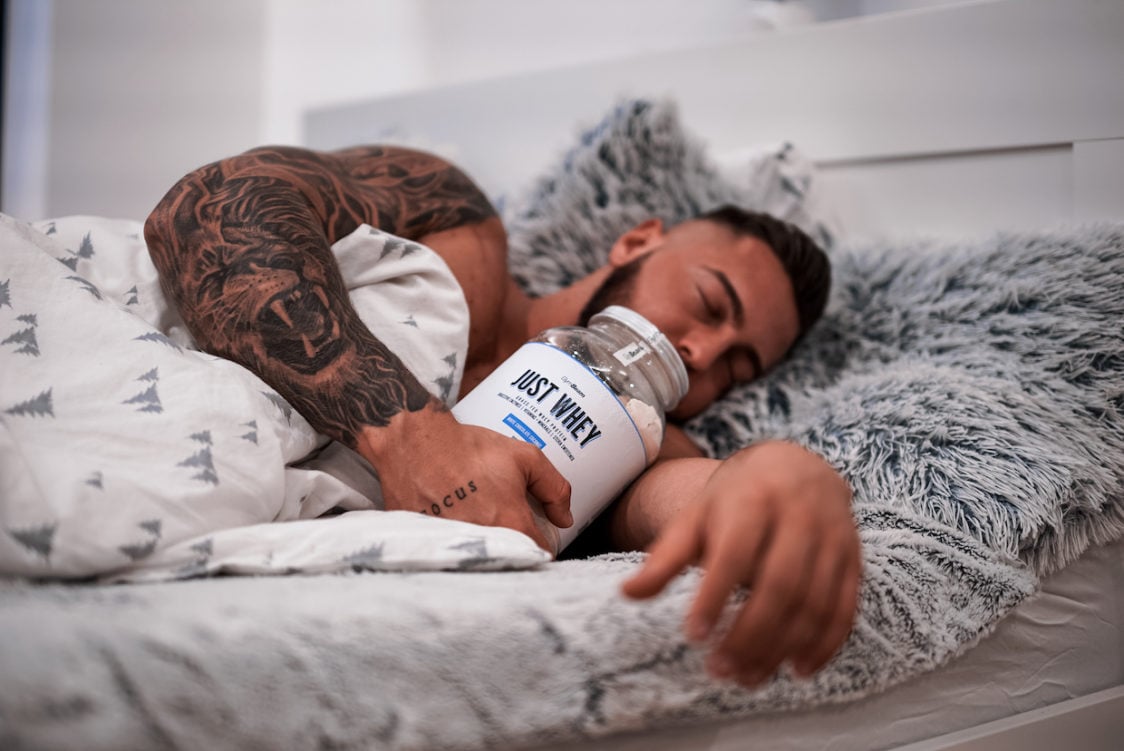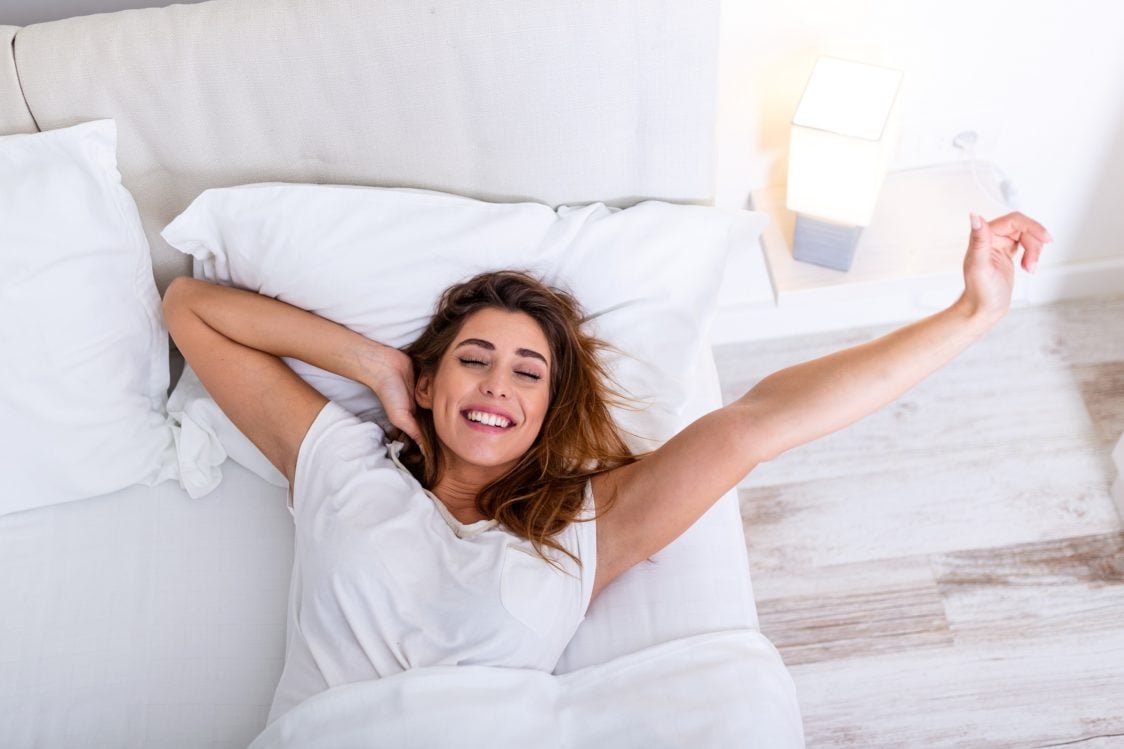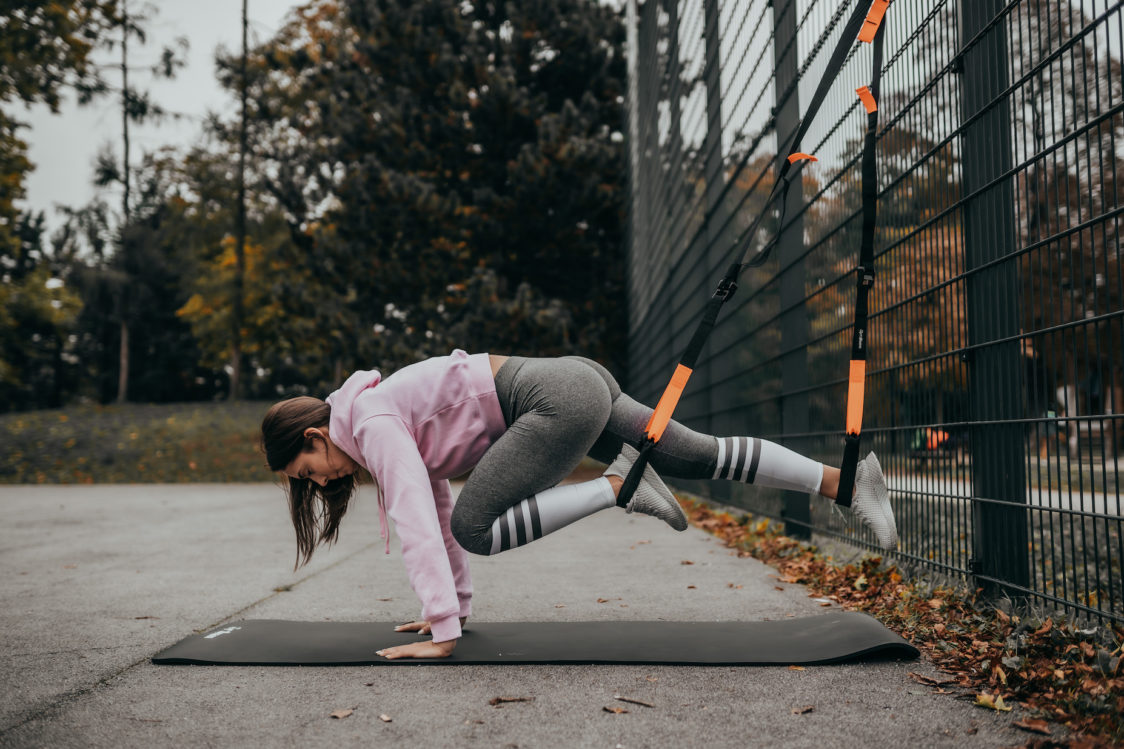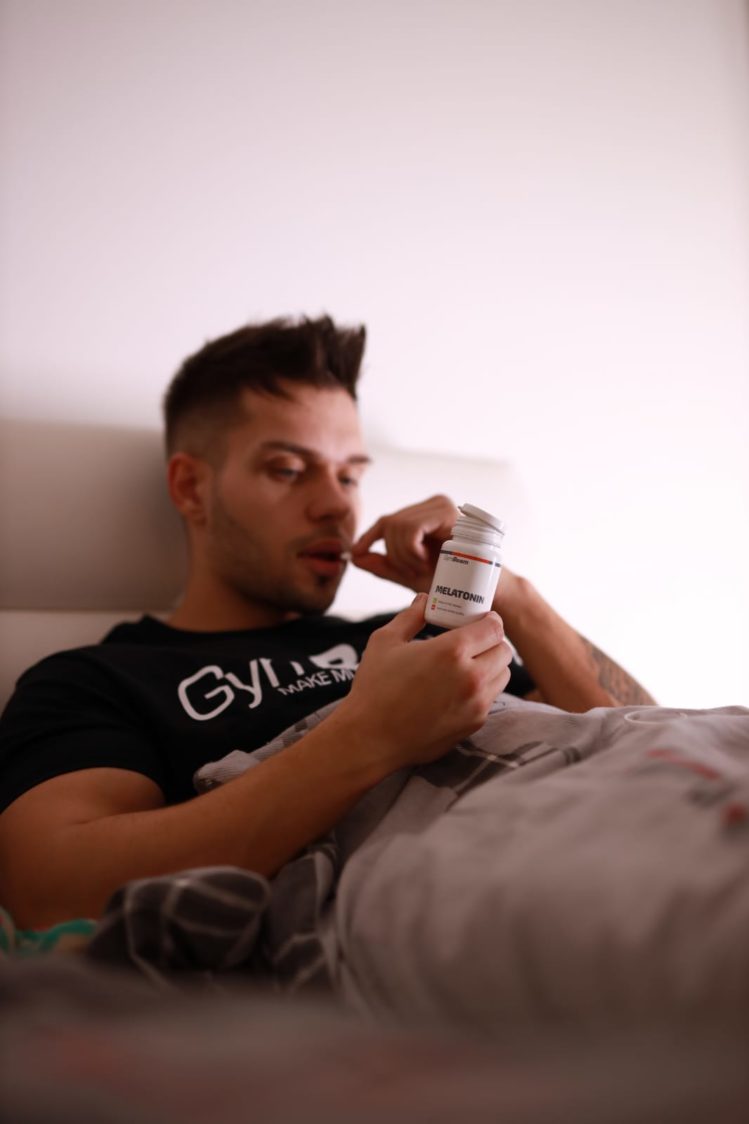Table of Contents
It would be hard to find someone who doesn’t love to sleep. But there are still plenty of people who don’t get enough of it. Its deprivation can have many reasons. Often it is related to the number of responsibilities we have or the fast-paced world we live in. Not everyone knows how to manage their time efficiently. Sleep activity is thus often the part which we pay only the minimum necessary attention to.
However, sleep is extremely important not only when it comes to a healthy lifestyle, but also when exercising. Proper sleep habits help maintain many biological processes, such as healthy brain function or the body’s defence mechanism. Poor sleep can cause them to be suboptimal or even dysfunctional. Have you ever wondered how a lack of sleep affects your body? [8]
Good night – why do we need sleep?
Sleep is essential for our health. We need it to survive. At this level, it is as important as the fact that we need to eat or drink. No wonder that sleep should make up as much as one-third of our lives. [1]
During sleep, many biological processes take place in our body [2]:
- the brain stores new information and clears out toxins
- nerve cells communicate and reorganize, which promotes healthy brain function
- the body repairs cells, restores energy and releases molecules such as hormones and protein, which are important for optimal regeneration
These processes are crucial to our overall health. Without them, our body would not be able to function in normal mode. Lack of sleep increases the risk of many diseases, such as depression, seizures, high blood pressure or migraine complications. [3]
Scientists divide sleep into two main phases [4]:
- Non-REM sleep (Non Rapid Eye Movement)
- REM sleep (Rapid Eye Movement)
Non-REM represents about 75 to 80% of the total time we spend sleeping. REM makes up the remaining 20 to 25%. Sleep cycles alternate four to five times during the night. The average length of the first one is 70 to 100 minutes. The second one increases to 90-120 minutes.

Non-REM and its stages
Non-REM sleep is the first sleep phase that acts as a transient state between waking and sleeping. It has several phases [2] [6] [33] [34]:
- The first phase (N1) occurs immediately after falling asleep and is very short. It usually takes less than 10 minutes. Brain waves, heart rate and eye movements slow down. We are in a light sleep from which we can wake up very easily.
- The second phase (N2) lasts 10 to 25 minutes in the initial cycle. It lengthens with each and every subsequent cycle. In this phase, your muscles relax more, your body temperature drops, your eye movement stops and your brain switches to slow wave activity.
- In the third and fourth phase (N3 / N4) we enter deep sleep. The eyes and muscles do not move and the brain waves slow down even more. Accidental movements may also occur. Waking up from this phase is quite difficult. This is the necessary phase for you to feel fresh after waking up.
REM sleep and its importance
REM sleep occurs about an hour to an hour and a half after the process of falling asleep. Each subsequent cycle during the night gets longer and longer. The first one usually lasts about 10 minutes and the last one can take up to an hour. This is the so-called weaker sleep, which is more like a waking state. A characteristic feature of this phase is the rapid side to side movement of the eyes under the lids.
It does not have to happen regularly and scientists do not know exactly what is causing it. They believe it is associated with dreaming. During REM sleep, the brain is active almost as much as when we are awake. It processes all the information received during the day so that it can store it in long-term memory. At the same time, it strengthens the connection between new information.
Brain activity is also related to the fact that REM sleep is often associated with vivid dreams. This phase can also be accompanied by rapid and irregular breathing, changes in body temperature, twitching or sexual arousal in both men and women. REM sleep occurs about three to five times a night. [5] [7] [9]

The effect of sleep on physical activity
People who exercise usually need more sleep than those who are not physically active. Especially if they train with high intensity. The main tasks of sleep include the replenishment of energy and the overall regeneration of a stressed organism. It is therefore logical that the more we exercise, the more we deplete energy, and we need longer sleep. Top-class athletes also realize this and sleep much longer than usual. For example, LeBron James or Roger Federer tend to sleep about 12 hours a day. [10] [35]
Sleep is also responsible for the proper functioning of the immune and endocrine systems. It produces and spreads key performance hormones throughout the body, such as testosterone and growth hormone. The quality of sleep before and after exercise is important for maximum physical performance and quality regeneration. Scientists think that the reason behind this is that growth hormone is released during exercising. Its role is to stimulate muscle growth and regeneration, bone formation and fat burning. [11]
These are the conclusions of several studies on the interaction between sleep and physical activity [12] [13] [14]:
- A Stanford University study followed a women’s tennis team for five weeks. Participants were to sleep 10 hours a day. Compared to their standard sleep mode, which was shorter, they were found to be able to deliver more accurate tennis strokes and sprint faster.
- Prolonged sleep has helped to improve the performance, mood and alertness of athletes in swimming and basketball teams for both men and women. They were able to sprint faster and the accuracy of their aim also improved. The study also had a positive effect on their sleep patterns, which improved on average by 111 minutes.
- Regular exercise is very beneficial in promoting good sleep. This is clearly reflected in the results of a study where a group of people with sleep problems undergoing regular aerobic exercise confirmed an increase in sleep activity of 75 minutes per night.
To learn more about sleep and its effects on muscle growth, read our article – How to Improve Sleep and How It Affects Health and Muscle Growth.

How much sleep do we need
Our need for sleep changes with age. It also differs for individuals of the same age. There is no magic formula for ideal sleep that works for all people. Children initially sleep 16 to 18 hours a day, which can support their growth and development.
Most adults are recommended 7 to 9 hours of sleep. According to the CDC you should not sleep less than 7 hours. A lack of sleep is generally considered to be less than 6 hours. However, these are only indicative values and may vary slightly from one individual to another. Various factors must be taken into account to determine a more accurate value. Sleep length also depends on your overall health or the daily activities you perform. [15] [16] [36]
You can ask yourself the following questions when determining your individual sleep needs. It is advisable to start with the recommended time, which you then adjust based on your answers. [17] [18]
Find out whether you have quality sleep
- Are you productive, healthy and happy after seven hours of sleep? Or have you noticed that you need to sleep more?
- Do you have health problems or weak immune system?
- Is your daily energy consumption high? Do you do sports regularly or do you work a lot?
- Do your daily activities require vigilance so that you can perform them safely?
- Do you operate heavy machinery every day / often? Do you ever feel sleepy while doing so?
- Are you addicted to caffeine and you can’t imagine to go a day without it?
- Do you sleep more on your days off than during a standard workweek?
- Have your partner noticed that you suffer from insomnia?
You might be interested in these products:
Lack of sleep vs. organism
As clearly explained above, without enough sleep, our body can hardly function properly. Lack of sleep is associated with chronic diseases that affect the heart, kidneys, blood, brain and mental health. A person with a lack of quality sleep can suffer from various symptoms. [2]
Typical symptoms of lack of sleep:
- fatigue
- irritability
- mood swings
- issues with concentration and memory
- decreased sexual activity
- increased cravings for sweet and high-calorie foods
- weight gain
- high blood pressure
- lesser feeling of satisfaction after a meal [19]
How can lack of sleep affect your body?
Immune system – you may be more susceptible to various infections and diseases of the respiratory tract and their treatment will take longer.
Cardiovascular system – sleep is also an important factor for heart health. Its long-term deficiency is associated with a higher risk of cardiovascular disease, led by high blood pressure. At the same time, it affects the processes that maintain healthy blood pressure and sugar levels.
Hormone levels – Lack of sleep can affect the production of growth hormone, testosterone and other hormones. It also causes the release of stress hormones such as cortisol. Its sustained elevated level is related, for example, to a negative effect on immunity, but also to the gain of fat in the abdominal area. The change in the levels of leptin and ghrelin (hormones of hunger and satiety) is also linked to this. When we lack sleep, this hormones stimulate us to eat more, especially high-calorie foods, after which we feel less satisfied.
Brain – Lack of sleep can suppress the activity of brain cells. Researchers have found that when a person is tired, brain neurons are slower in sending signals. This often reduces decision-making capabilities and reaction times.
Metabolism – lack of sleep leads to worsening of glucose tolerance (risk of diabetes) and weight gain. According to several studies, people have better results in losing weight when they sleep well. Good sleep can reduce overeating and make it easier to do physical activity by waking up more energetic and fresher. [20–25] [37–38]
Stages of sleep deprivation
General stages of sleep deprivation describe problems based on how much sleep you missed [30-32]:
- 24-hour phase: not uncommon and does not cause major health problems. You can expect to feel tired and irritated. It is also accompanied by swelling and the under-eyes circles, or even microsleep. According to the CDC, the symptoms can be compared to having 0.1% of alcohol in your blood.
- 48 hours phase: the symptoms become more intense, and you have a great urge to sleep. The frequency of microsleep increases and impaired cognitive performance may occur. Even hallucinations and learning difficulties are mentioned. Anxiety, stress, behavioural changes, slow reaction times, impaired immunity and increased appetite may occur.
- 72-hour phase: three days without sleep have a significant effect on mood and cognitive function. Those are accompanied by severe problems with concentration and memory, communication difficulties, paranoia or extreme fatigue.
- 96-hour phase: this is a severe lack of sleep. Your perception of reality can be distorted and the urge to sleep becomes unbearable. You may get into a psychosis from lack of sleep, which prevents you from interpreting reality correctly. Its effects usually go away when you get enough sleep.
Several studies have looked at resolving these symptoms of sleep deprivation. The findings show that most participants needed about 50% of the time to recover. This means that if they lacked 50 hours of sleep, they needed 100 hours to recover. However, this is only an approximate figure.
Some participants were fine after one night’s sleep, others needed more time to recover. However, a few participants reported that their problems persisted for several days or weeks. It was mainly confusion, negative moods or distorted perception of reality. [39]

Five tips on how to improve your sleep
If you suffer from lack of sleep, there is no need to panic. Sometimes little is needed to improve sleep cycles. Try our five tips that can help you.
- Create a peaceful environment
The ideal place to sleep is often cool, dark and quiet. Sleeping with a light on can be more difficult. You should also avoid prolonged screen time just before bedtime. The blue light it emits can stimulate your brain and reduce melatonin production. Consider using earbuds or earplugs to create an environment that best suits your needs. [26]
- Try to manage your worries
Try to resolve your worries or concerns before going to bed. If you come up with something, write it down and put it off until tomorrow. It can help you manage stress and avoid complicated thoughts before bed. Meditation, breathing exercises or cold baths can also help. [26]
- Exercise regularly
Add regular exercise to your daily routine. Exercising about three hours before sleep will help you promote a good night’s sleep. Exercise also helps you fall asleep faster and make your sleep healthier. [27]

- Do not consume caffeine in late hours
Caffeine has many benefits and acts as a stimulant. One dose can positively affect energy levels and athletic performance. It stimulates your nervous system and can prevent the body from relaxing naturally during the night.
One study found that taking caffeine up to 6 hours before bedtime significantly worsened the quality of sleep itself. However, this depends on how quickly can your body break down caffeine. [28]
- Try sleep aids and supplements
Melatonin is a key sleep hormone that informs your brain that it is time to rest. It is also often used to treat sleep disorders and has been the subject of various studies with positive results.
For example, taking 2 mg of melatonin just before bedtime helped participants of a study fall asleep faster, sleep better, and get more energy the next day.
If you want to find more about it, you shouldn’t skip our article Melatonin – Does It Really Improve Sleep and Helps You Fall Asleep.
Common valerian also has a positive effect on sleep, and it goes hand in hand with gamma-aminobutyric acid (GABA). [29]
Summary
Good sleep has a number of positive effects on our body. When we sleep, the brain stores new information and helps us get rid of toxins. The effect of sleep goes hand in hand with exercise and other physical activities. Its main tasks in this regard include the restoration of energy, regeneration of the body, sorting and preserving memories, but also newly learned things. Sleep also affects the excretion of key substances such as testosterone or growth hormone. A healthy sleep cycle should last about 7 to 9 hours. Anything below 6 hours is considered insufficient.
However, every individual has his own needs. The absence of sleep can have a negative effect on the immune and cardiovascular system, the brain, hormone levels or metabolism. A suitable environment and regular exercise are important for better sleep. In the evening, you should also avoid emitting blue light from a display, which blocks the secretion of the sleep hormone – melatonin.
How many hours a day do you sleep? Are you more of an early bird or a night owl? Do you make sure that you get enough sleep before and after exercise? Be sure to share your opinion in the comments. If you liked the article, support us by sharing it.
[1] Michael J Aminoff, François Boller, Dick F Swaab – We spend about one-third of our life either sleeping or attempting to do so. – https://pubmed.ncbi.nlm.nih.gov/21056174/
[2] Kirsten Nunez, Karen Lamoreux – What Is the Purpose of Sleep? – https://www.healthline.com/health/why-do-we-sleep#why-do-we-sleep
[3] The Science of Sleep: Understanding What Happens When You Sleep. – https://www.hopkinsmedicine.org/health/wellness-and-prevention/the-science-of-sleep-understanding-what-happens-when-you-sleep
[4] The Science of Sleep: Stages and Cycles – – https://www.helpguide.org/harvard/biology-of-sleep-circadian-rhythms-sleep-stages.htm
[5] Sleep Basics – – https://my.clevelandclinic.org/health/articles/12148-sleep-basics
[6] Stages of Sleep – – https://www.uofmhealth.org/health-library/hw48331
[7] Cari Nierenberg – REM vs. Non-REM Sleep: The Stages of Sleep. – https://www.livescience.com/59872-stages-of-sleep.html
[8] Kamal Patel – How important is sleep? – https://examine.com/nutrition/how-important-is-sleep/
[9] Jayne Leonard – What is REM sleep? – https://www.medicalnewstoday.com/articles/247927#what-is-rem-sleep
[10] Lauren Bedosky – Struggling with Your Workouts? Try Getting Better Sleep. – https://www.menshealth.com/fitness/a23458087/sleep-effects-workout-exercise-performance/
[11] Julia Rodriguez – How Does Sleep Affect Exercise Recovery? – https://www.sleepdr.com/the-sleep-blog/how-does-sleep-affect-exercise-recovery/
[12] Charles Samuels – Sleep, Recovery, and Performance: The New Frontier in High-Performance Athletics. – https://www.sciencedirect.com/science/article/abs/pii/S0733861907001351?via%3Dihub
[13] Cheri D. Mah, MS, Kenneth E. Mah, MD, MS, Eric J. Kezirian, MD, MPH, William C. Dement, MD, PhD – The Effects of Sleep Extension on the Athletic Performance of Collegiate Basketball Players. – https://academic.oup.com/sleep/article/34/7/943/2596050
[14] Kathryn J. Reid, PhD, Kelly Glazer Baron, PhD, Brandon Lu, MD, Erik Naylor, PhD, Lisa Wolfe, MD, and Phyllis C. Zee, MD, PhD – Aerobic exercise improves self-reported sleep and quality of life in older adults with insomnia. – https://www.ncbi.nlm.nih.gov/pmc/articles/PMC2992829/
[15] Brain Basics: Understanding Sleep – – https://www.ninds.nih.gov/Disorders/patient-caregiver-education/Understanding-sleep
[16] How Much Sleep Do I Need? – – https://www.cdc.gov/sleep/about_sleep/how_much_sleep.html
[17] Eric Suni – How Much Sleep Do We Really Need? – https://www.sleepfoundation.org/how-sleep-works/how-much-sleep-do-we-really-need
[18] James Roland – How to Calculate When You Should Go to Sleep. – https://www.healthline.com/health/sleep/sleep-calculator#not-enough-sleep
[19] Joseph A. Hanson; Martin R. Huecker. – Sleep Deprivation. – https://www.ncbi.nlm.nih.gov/books/NBK547676/
[20] Sumer S. Choudhary and Sanjiw R. Choudhary – Sleep effects on breathing and respiratory diseases. – https://www.ncbi.nlm.nih.gov/pmc/articles/PMC2876696/
[21] Qiao He, Peng Zhang, Guangxiao Li, Huixu Dai, Jingpu Shi – The association between insomnia symptoms and risk of cardio-cerebral vascular events: A meta-analysis of prospective cohort studies. – https://journals.sagepub.com/doi/10.1177/2047487317702043
[22] Gary Wittert – The relationship between sleep disorders and testosterone in men. – https://www.ajandrology.com/article.asp?issn=1008-682X;year=2014;volume=16;issue=2;spage=262;epage=265;aulast=Wittert
[23] Yuval Nir, Thomas Andrillon, Amit Marmelshtein, Nanthia A Suthana – Selective neuronal lapses precede human cognitive lapses following sleep deprivation. – https://www.researchgate.net/publication/320882207_Selective_neuronal_lapses_precede_human_cognitive_lapses_following_sleep_deprivation
[24] Medic G, Wille M, Hemels ME – Short- and long-term health consequences of sleep disruption. – https://www.dovepress.com/short--and-long-term-health-consequences-of-sleep-disruption-peer-reviewed-article-NSS
[25] Nutrition and Sleep – – https://www.sleepfoundation.org/nutrition
[26] Sleep tips: 6 steps to better sleep – – https://www.mayoclinic.org/healthy-lifestyle/adult-health/in-depth/sleep/art-20048379
[27] Twelve Simple Tips to Improve Your Sleep – – http://healthysleep.med.harvard.edu/healthy/getting/overcoming/tips
[28] Christopher Drake, Timothy Roehrs, John Shambroom, Thomas Roth – Caffeine effects on sleep taken 0, 3, or 6 hours before going to bed. – https://pubmed.ncbi.nlm.nih.gov/24235903/
[29] Ingeborg M van Geijlswijk, Robert H Mol, Toine C G Egberts, Marcel G Smits – Evaluation of sleep, puberty and mental health in children with long-term melatonin treatment for chronic idiopathic childhood sleep onset insomnia. – https://pubmed.ncbi.nlm.nih.gov/21340475/
[30] Drowsy Driving – – https://www.cdc.gov/sleep/about_sleep/drowsy_driving.html
[31] Kirsten Nunez – The 5 Stages of Sleep Deprivation. – https://www.healthline.com/health/sleep-deprivation/sleep-deprivation-stages#timeline
[32] Jamie Eske – The effects of going more than 24 hours without sleep. – https://www.medicalnewstoday.com/articles/324799#48-hours-without-sleep
[33] Aakash K. Patel, Vamsi Reddy, John F. Araujo – Physiology, Sleep Stages. – https://www.ncbi.nlm.nih.gov/books/NBK526132/
[34] Sleep Disorders and Sleep Deprivation: An Unmet Public Health Problem. – https://www.ncbi.nlm.nih.gov/books/NBK19956/
[35] Nan-Hie In – How sleep helps athletes like LeBron James and Roger Federer – and the ways we can get a good night’s rest too. – https://www.scmp.com/lifestyle/health-wellness/article/2156133/how-sleep-helps-athletes-lebron-james-and-roger-federer
[36] Sara E. Luckhaupt, SangWoo Tak, Geoffrey M. Calvert – The Prevalence of Short Sleep Duration by Industry and Occupation in the National Health Interview Survey. – https://www.ncbi.nlm.nih.gov/pmc/articles/PMC2817902/
[37] Habib Yaribeygi, Yunes Panahi, Hedayat Sahraei, Thomas P. Johnston a Amirhossein Sahebkar – The impact of stress on body function: A review. – https://www.ncbi.nlm.nih.gov/pmc/articles/PMC5579396/
[38] Shahrad Taheri, Ling Lin, Diane Austin, Terry Young, Emmanuel Mignot – Short sleep duration is associated with reduced leptin, elevated ghrelin, and increased body mass index. – https://pubmed.ncbi.nlm.nih.gov/15602591/
[39] Flavie Waters, Vivian Chiu, Amanda Atkinson a Jan Dirk Blom – Severe Sleep Deprivation Causes Hallucinations and a Gradual Progression Toward Psychosis With Increasing Time Awake. – https://www.ncbi.nlm.nih.gov/pmc/articles/PMC6048360/

